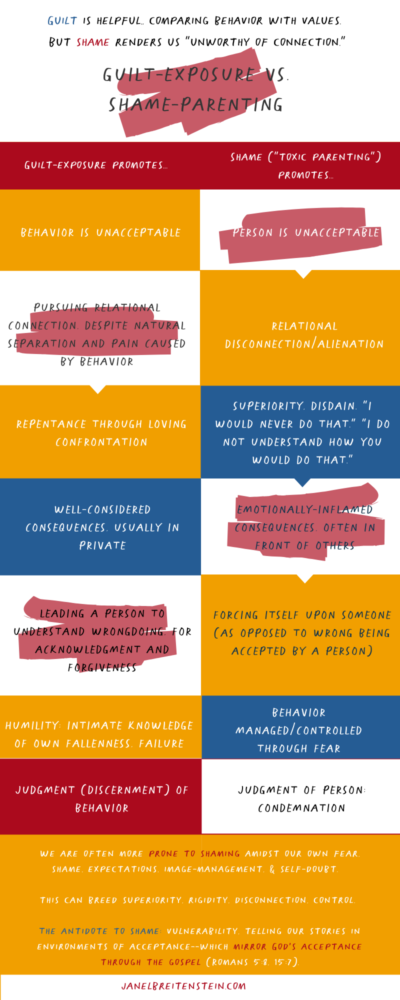 Completely Pretty much hypothetical situation. Say one of your kids—well, one of my kids, anyway—teases a sibling to the point of tears. (I know. Whose kids would do that?!)
Completely Pretty much hypothetical situation. Say one of your kids—well, one of my kids, anyway—teases a sibling to the point of tears. (I know. Whose kids would do that?!)
Let’s take a gander at a few of our parenting options, shall we?
a. “How could you do that to him/her? You are such a bully. Ugh. I am so disgusted with you.”
b. “Get over here! What were you thinking?! I cannot believe you.”
c. “Hey, we need to talk about this. Take a look at your sister for a minute. Let’s think about what it’s like to be in her shoes right now. What do you think she’s feeling? Have you ever felt that way? Do you think you built her up, or tore her down? What do you think you should do?”
I hope I would choose c; I do.
But when forming this decision in a perfect storm of hormones, loathsome traffic, summer heat, and a full week of kids acting as if they were raised by wolves, I wish I were not so enticed by options a and b.
What’s the difference between leading our kids toward appropriate guilt—and shaming them, otherwise known as (gulp) toxic parenting?
I’m finding it’s a critical distinction. Researcher Dr. Brene Brown articulates,
Knowing shame is positively correlated with addiction, depression, aggression, violence, eating disorders, and suicide, and that guilt is inversely correlated with these outcomes, we naturally would want to raise children who use more guilt self-talk than shame.* (emphasis added)
Here’s what I’m realizing: Toxic parents probably do not know they are parenting toxically.
So can we know? Where’s the line?
Author Heather Davis Nelson writes in this excellent post on “10 Things You Should Know about Shame”,
Guilt’s message is, “I did something bad,” and needs justification and forgiveness. Shame’s message is, “I am bad,” and needs an identity shift and relational connection. Sin leaves both in its wake, and shame is what lingers even after forgiveness has been sought and granted. Shame feels like it’s welded onto you, but guilt feels like something outside of you.
Parenting with shame seems to say, You are unacceptable to me right now. Parenting for guilt awareness seems to say, I accept you. But I care about you enough to come alongside you for change.
It’s the difference between “God’s kindness leads us to repentance” and the heat of fear curling us inside, hardening us into conformity.
I like the distinction posed by Brown, who vitally links shame to disconnection in our relationships.
Based on my research and the research of other shame researchers, I believe that there is a profound difference between shame and guilt. I believe that guilt is adaptive and helpful – it’s holding something we’ve done or failed to do up against our values and feeling psychological discomfort.
I define shame as the intensely painful feeling or experience of believing that we are flawed and therefore unworthy of love and belonging – something we’ve experienced, done, or failed to do makes us unworthy of connection.
I don’t believe shame is helpful or productive. In fact, I think shame is much more likely to be the source of destructive, hurtful behavior than the solution or cure. I think the fear of disconnection can make us dangerous. (emphasis added)
Here’s how I boil down the difference. (Print this infographic here free.)

Watching other parents use shame in discipline has the power to crumple me like tinfoil inside–because we’ve all been on both the giving and receiving ends of shame’s branding heat. I want to say, grace. Grace! Oh, teach them grace!
Brown quotes author Toni Morrison: “You think your affection and your deep love is on display because you’re caring for them. It’s not. When they see you, they see the critical face. What’s wrong now?” It hurts my heart to think of how many times my kids may have felt this toward me.
Sometimes I think I’m most tempted to shame my kids in the clutches of
- my own fear (Look at the person he’s becoming!)
- my own shame and reputation (What are those other moms thinking about my kid? About me?!)
- my own expectations (I can’t believe my kid would do something like this!)
- my own questions of legitimacy in my parenting (What does this say about me as a parent? Surely a good parent would have a good child.) (BTW–if you resonate with these, don’t miss this post, “Parenting a Difficult Child.” It encourages me.)
My fear breeds superiority; rigidity; disconnection; control.
In contrast, when I’m loving them more than my fear, it’s easier to connect with them in humility, in constructive questions, in working together toward a solution rather than against each other.
I like how Proverbs 23:26 puts it: My son, give me your heart.
It may take a long time, but I hope my kids and I can eventually identify and annihilate this deforming shame.
I long for us to plunge deeply together into that warm, unexpected pool where there is “no condemnation for those who are in Christ Jesus” (Romans 8:1). I hope we come to settle there, engulfed by favor we did not and could never earn; in forgiveness and utter acceptance earned for us, not by us.
*Brown, Brene. Daring Greatly: How the Courage to Be Vulnerable Tranforms the Way We Live, Love, Parent, and Lead. New York: Avery Publishing (2015).
Like this? You might like
Shame–and Your Marriage: On the Fear and the That Keeps Us Hiding (and on Clawing Your Way Out)
The Scribbled Heart: Fear-Parenting vs. Faith-Parenting








2 Comments
Morgan - 9 years ago
“Knowing shame is positively correlated with addiction, depression, aggression, violence, eating disorders, and suicide, and that guilt is inversely correlated with these outcomes…”
It’s an interesting question but is there any specific clinical evidence for these assertions you could point us to, especially knowing that correlation does not prove causality?
Janel - 9 years ago
Morgan, this is a well-placed question. I derived this quote directly from Dr. Brown’s book, cited in my footnotes. Though she’s a well-respected researcher, I must admit that I personally cannot offer you her sources. She writes more about her research and methodology here : http://brenebrown.com/research/ I’m hoping she can answer your question better than I. Thanks for writing in, and I regret that I personally cannot offer a more sufficient answer!